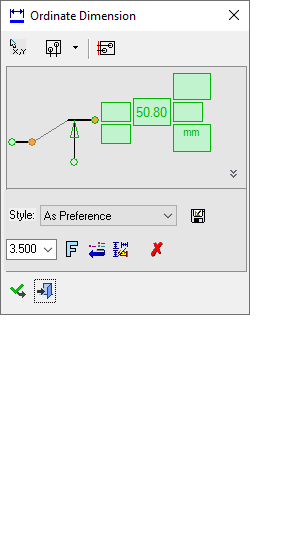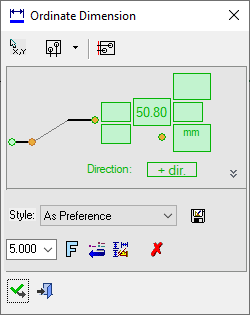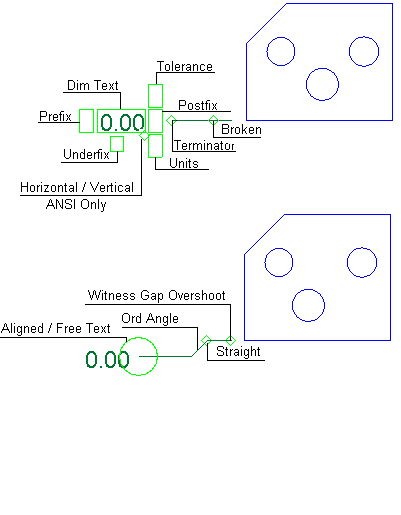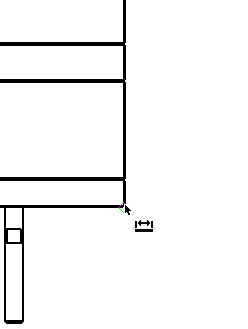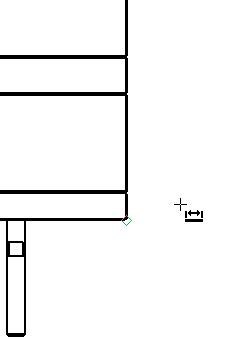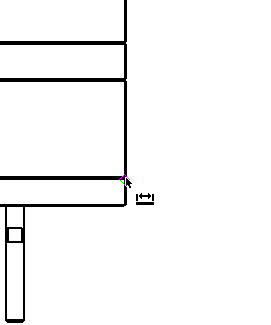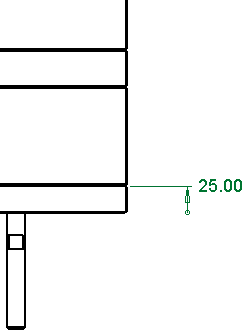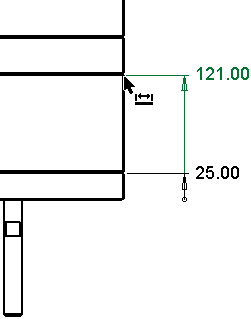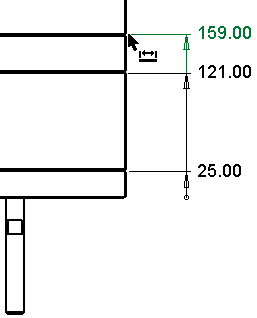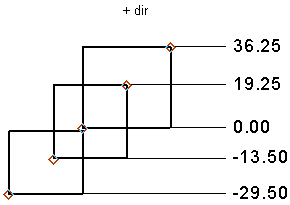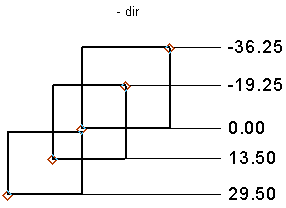Ordinate Dimension 
Access: Open this function from one of the following locations:
-
Click the
 button in the toolbar, or
button in the toolbar, or -
Select Symbols > Textual > Ordinate Dimension from the menu bar.
Create Ordinate dimensions.
Allows the definition of the ordinate dimension direction via view entities (two points or a line), which can be aligned with view rotation or angled details. You can control and edit the dimension distance from the view or selected points.
A Preferences option enables you to set the default distance between 2 ordinate dimensions.
|
Ordinate Dimension dialog: Click on an item in the dialog for a description.
|
|
|
|
ISO or JIS standard dialog |
ANSI standard dialog - for the Direction settings, see Ordinate Chain (ANSI) below |
Example Ordinate Dimension: |
|
|
|
|
See also:
General Interaction
InvokeInvoke the Ordinate Dimension function. A grayed out dialog is initially displayed.
See the Dimensioning Process for additional information.
In the Ordinate Dimension dialog, select the Base Point Command ![]() button in the Ordinate Dimensions Positioning Options to select a base (origin) point from which the dimension will start.
button in the Ordinate Dimensions Positioning Options to select a base (origin) point from which the dimension will start.

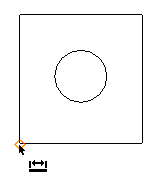
The remaining buttons in the Ordinate Dimensions Positioning Options enable you to set the direction of the ordinate chain and the distance from the selected base point to which all dimensions will be aligned. The first dimension is created at the distance from the selected point defined in the Preferences.
Pick the target point, center line or symmetry line. The ordinate dimension is displayed.
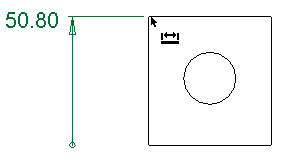
Edit its parameters with the help of the hot spots and tips either directly in the graphic area or on the popup submenu. Click the breakpoint and drag it, change the font style and character size if required.
Press <exit><exit> when finished.
Pick the point and position the dimension.
Return to Step 5.
Note: For additional information, see the Dimensioning Process and the attached notes.
Dimension Dialog for Ordinate Dimensions
|
The Ordinate Dimension dialog displays Click on an item in the dialog for a description.
|
Example Ordinate Dimension labels: Click a label for a description. |
|
|
ISO or JIS standard dialog |
ANSI standard dialog - |
See Dimension Overview for a general description. |
|
|
|
|
Ordinate Dimensions Positioning Options
Set general ordinate dimension definitions. This section works in stages from left to right.

|
|
Stage 1: Pick the dimension Base Point Command button. This button is selected by default and can be reselected to pick a different base point. Pick the next dimension point to indicate the dimension direction. |
|||||
|
|
|
|
|
|
|
|
|
Stage 2: |
|
Stage 3: |
||||
|
|
|
Ordinate Direction: Horizontal: Display the ordinate chain horizontally. |
|
 |
Select Ordinate Distance: The first dimension is created at the distance from the selected point defined in the Preferences. Click this button, to select any point and all aligned dimensions will move to it. Once a selection is made, this mode is exited automatically, however, you can also exit this mode using the MMBMMB or the ESC key. |
|
|
|
Ordinate Direction: Vertical: Display the ordinate chain vertically. |
|
||||
|
|
Ordinate Direction: By Selection Define the direction to display the dimension line by picking two points or a line. |
|
||||
Once these stages are complete, you can start selecting the points for the ordinate dimensioning.
Ordinate Chain
Ordinate dimensions can be automatically arranged in a chain as follows:
|
1. InvokeInvoke the Dimensions function and pick an origin point: |
2. Pick a point in the graphic area through which the ordinate line will pass: |
3. Pick the target point, center line or symmetry line: |
|
|
|
|
|
3a. The dimension is displayed in the graphic area: |
4. <exit><exit> and pick the next point,center line or symmetry line. The ordinates automatically appear aligned: |
5. Repeat step 4 to align additional ordinates: |
|
|
|
|
Ordinate Chain (ANSI)
When creating a chain in the ANSI drawing standard (Ordina absolute value = NO), the added option exists to control the positive and negative directions of the relative ordinates. This is done by toggling the Direction parameter in the Ordinate Dimension dialog after picking the first target point (Direction option is activated).
In the example below, the direction from the origin point has been flipped, from +dir to -dir.
|
|
|
Notes:
-
To automatically attach a new ordinate to an existing chain, double-click, <exit><exit> and pick the next point, center line or symmetry line.
-
The default minimum Distance between 2 ordinate dimensions can be modified in the Preferences.
Advanced Area Options
All Dimension dialogs have an Advanced Area where additional dimension options are available. Click the Expand toggle button ![]() on the Dimension dialog to show the Advanced Area parameter(s).
on the Dimension dialog to show the Advanced Area parameter(s).
The Inspection Dimension option appears in all the Dimension dialogs; however, additional options may also appear here depending on the entity selected to be dimensioned.
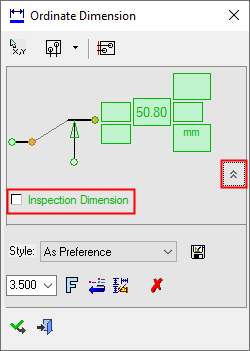
|
Inspection Dimension |
Surround dimensions with a rounded outline. This means that it is a dimension that should be inspected/verified after production.
|
Detailed Interaction
See Options and Results.

